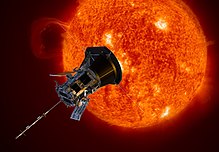Shadia Habbal
Shadia Habbal | |
|---|---|
| Born | Syrian, American |
| Alma mater | University of Cincinnati |
| Scientific career | |
| Fields | Aerospace |
Shadia Rifa'i Habbal (
Life and education
She was born as Shadia Na'im Rifa'i in the city of
Career
She completed a one-year ASP term at the
In 2002 she was appointed editor in the Journal of Geophysical Research, Space Physics Section. Prof Habbal is a member of many professional bodies including the American Astronomical Society, the International Astronomical Union, the Hawaii Institute for Astronomy as well as being a fellow of the Royal Astronomical Society.[2]
Research

Prof. Habbal focus on the origin and evolution of the solar wind, solar magnetic fields and eclipse polarimetric observations.[4] She led more than a dozen solar eclipse expeditions, visiting places such as India (1995), Guadeloupe (1998),[5] China (2008), French Polynesia (2010), US (2017), Australia (2023), and US (2024) sponsored by the NSF and NASA.[3] Habbal led a team of the Hawaii Institute for Astronomy that took part in the observation of solar corona during eclipse in association with NASA in 2006, 2008 and 2009,[6] she also played a key role in establishing the NASA Parker Solar Probe, which launched in 2018 and was the first spacecraft to fly into the solar corona.[7] Prof. Habbal developed innovative ways to view the eclipse, including an on-board ship stabilization system for the 2021 Antarctica eclipse (funded by NSF) and a kite-based platform first tested during the 2023 Australia eclipse (funded by NASA). She is leading a campaign for the US 2024 eclipse that will include observations on the ground, by kite, and by airplane with the NASA WB-57 research aircraft.
Honors
- Pioneer, Arab Thought Foundation, December 2004.[4]
- Certificate of Guest Professor from the University of Science and Technology of China, Hefei, September 4, 2001.[4]
- NASA Group Achievement Award, Spartan 201 white Light Coronagraph Team, Washington DC, August 14, 2000.[4]
- Adventurous Women Lecture Series Award, Harvard-Smithsonian Center for Astrophysics Women's Program Committee, June 8, 1998.[4]
- Certificate of Appreciation for outstanding service and support - Harvard-Smithsonian Center for Astrophysics, December 19, 1997.[4]
- Certificate of Appreciation for outstanding service -National Research Council, Board on Atmospheric Sciences and Climate, 1996.[4]
- Certificate of Award in recognition of special achievement reflecting a high standard of accomplishment, Smithsonian Institution, July 25, 1993.[4]
Selected publications
- Zdeněk Hrazdíra; Miloslav Druckmüller; Shadia Habbal (23 December 2020). "Measuring Solar Differential Rotation with an Iterative Phase Correlation Method". The Astrophysical Journal Supplement Series. 252 (1): 6. Wikidata Q106192162.
- Benjamin Boe; Shadia Habbal; Miloslav Druckmüller (3 June 2020). "Coronal Magnetic Field Topology from Total Solar Eclipse Observations". Wikidata Q106192173.
- Zdenek Hrazdíra; Miloslav Druckmüller; Shadia Habbal (20 February 2020). "Iterative Phase Correlation Algorithm for High-precision Subpixel Image Registration". The Astrophysical Journal Supplement Series. 247 (1): 8. Wikidata Q106192174.
- Benjamin Boe; Shadia Habbal; Miloslav Druckmüller; Adalbert Ding; Jana Hodérova; Pavel Štarha (14 January 2020). "CME-induced Thermodynamic Changes in the Corona as Inferred from Fe xi and Fe xiv Emission Observations during the 2017 August 21 Total Solar Eclipse". Wikidata Q106192175.
- Fred Sigernes; Pål Gunnar Ellingsen; Noora Partamies; et al. (13 January 2017). "Video cascade accumulation of the total solar eclipse on Svalbard 2015". Geoscientific Instrumentation, Methods and Data Systems. 6 (1): 9–14. Wikidata Q57893542.
References
- ^ "علماء الفيزياء المسلمون في العصر الحديث" [Muslim physicists in the modern era]. uqu.edu.sa (in Arabic). Shadia Habba. Archived from the original on 2014-04-19.
- ^ a b "Sun expert in line for top award". BBC News. 11 May 2004.
- ^ a b "Shadia Habbal entry". National Center for Atmospheric Research. Archived from the original on 2014-04-23.
- ^ a b c d e f g h "Shadia R. Habbal entry". hawaii university.
- ^ "CfA EXPEDITION TO GUADELOUPE HOPES TO CATCH ECLIPSE". cfa.harvard.edu. Archived from the original on 2012-05-19.
- ^ "NASA observation of solar corona". Archived from the original on 2018-12-22. Retrieved 2014-07-16.
- ^ "Shadia Rifa'i Habbal". SIUE STEM. Archived from the original on 2021-06-24. Retrieved 2021-06-18.
